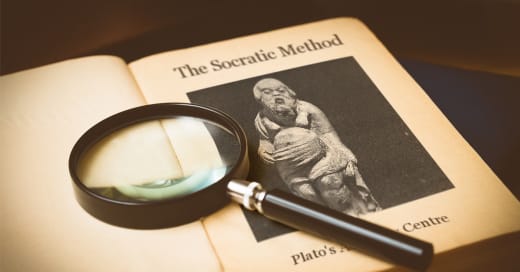This episode is part of the Plato’s Academy Centre course on the Socratic Method. In this lesson, we will be learning about the central techniques of the Socratic Method. We’ll begin by looking at how Socrates acquired definitions and evaluated them in order to refine important philosophical concepts. We’ll also learn about a simple “two-column method” found in the Socratic dialogues.
Socrates' trademark method was sometimes described as the "question and answer" approach. There's more to it than just asking lots of questions, though! It typically involved asking certain types of question, in a certain way, about certain topics.
Definitions
Socrates was known for insisting on definitions. We often waste our time arguing at cross-purposes when we disagree on the meaning of key terms being taken for granted in an argument. It can require surprisingly hard work to define familiar concepts – what, for instance, is time? Indeed, throughout history, a great deal of philosophy has involved the clarification of abstract concepts such as goodness, justice, and knowledge. Each of Plato's Socratic dialogues tends to focus on the task of defining a word, e.g., The Laches explores what the concept of "courage" means, The Symposium tries to define "love" and The Republic focuses in the definition of “justice”. If we can't pin down the meaning of these words adequately enough how can we hope to build more complex arguments employing them?
Socrates' method therefore typically begins by asking the other person to give a short verbal definition of the most important concept underlying their conversation. For example, in The Laches Socrates is asked, by two Athenian generals, about training young men in the art of hand-to-hand combat wearing heavy armour. Socrates uncovers that his friends are really asking, more fundamentally, about how to make their sons more courageous in battle. So he asks them to begin by defining courage.
The first definition he receives is that courage means standing your ground in the face of the enemy. To an Athenian officer that would have been the most obvious example of courage. A great deal of effort went into training soldiers to remain in their phalanx formation, and having the discipline to do so was one of the Athenian infantry's greatest strengths.
Broadening the Definition
Socrates often points out that the first definition offered is too narrow. He reminds his friends, for instance, that soldiers also show courage when engaged in an orderly retreat from the enemy. Moreover, unlike infantrymen, cavalry units charge at the enemy, rather than standing their ground. His friends agree that they'd overlooked such examples. Socrates therefore asks them how the definition of courage should be revised. This process of raising fresh examples and rewriting the definition can continue indefinitely. For instance, Socrates also reminds his friends that they're only thinking of courage in battle and have overlooked the fact that courage can take a different form during peacetime. "What is that common quality," asks Socrates, "which is the same in all these cases, and which is called courage?” Notice that Socrates is asking his partners in dialogue to provide a general definition, which is bound to end up being somewhat abstract. That tends to make it relatively easy for him to refute whatever they say as he merely has to come up with specific examples that conflict with it.
Narrowing the Definition
Eventually, the revised definition will be broad enough to encompass all of the relevant examples that can be identified. Socrates realized, though, that it would often now be too broad, meaning that it would also include some things that are not courage. His friends end up defining courage, basically, as a sort of persistence or fearlessness. Socrates now points out, though, that not all examples of fearlessness can be called courageous. Suppose someone walks fearlessly into a dangerous situation without even realizing they're taking a risk. If anything, that's a form of stupidity or recklessness, not courage. The definition needs to be reconsidered, this time it should be narrowed more, to exclude examples everyone agrees are not courageous.
The Socratic Method therefore often proceeds either by narrowing a definition, and introducing more fine-grained distinctions, or by broadening a definition, and grouping ideas together into greater generalizations.
Now I myself, Phaedrus, am a lover of these processes of division and bringing together, as aids to speech and thought; and if I think any other man is able to see things that can naturally be collected into one and divided into many, him I follow after and "walk in his footsteps as if he were a god." – Socrates in Plato's Phaedrus 266bc
The Two-Column Method
Xenophon, another of his students, actually said Socrates explained his method by using a two-column technique, similar to those found in modern cognitive therapy. One column might be headed "justice" and the other "injustice". We might list the key examples under injustice like "lying" or "stealing", etc. Socrates would then ask his students whether they could imagine a situation where these examples would belong under the other column — being classed not as unjust but as just. This is an easy way to practice clarifying our own definitions today. Lying might be a good example of injustice, for instance, but can you think of a situation where it might be considered appropriate and just to tell a lie? Socrates, for instance, gives the example of an elected general deceiving the enemy during a war. How might that lead us to revise our definition of justice?
The Socratic Method was carried out in a civil manner, as discussed in a previous lesson. The goal is to get closer to the truth, rather than to persuade anyone of anything by trying to make the false appear to be true. Some people found it infuriating to be questioned in this way, although Socrates' friends said it was also a liberating and enlightening experience.
If you're interested in discussing online you can join our Twitter chat about "How can we best define the virtue of justice?" using #SocraticMethod, and follow @PlatoAcademyCen.
Regards,
Donald Robertson
President of The Plato's Academy Centre
















Share this post